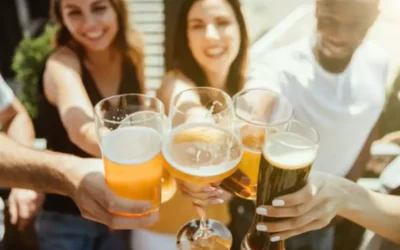Alcohol may be a temporary, unhealthy way to relieve anxiety and forget about your underlying stressors; however, using alcohol does not erase these underlying triggers. Additionally, symptoms of anxiety will still be lurking around the corner as the underlying triggers have not been properly addressed and treated. Hypersensitivity is when a person is so sensitive to changes in their body that they can’t help but notice and be affected by them. Every day most of us experience minor aches, pains, heart rhythm changes, and so on.
Alcohol and Panic Attacks
- Suddenly decreasing or stopping your alcohol intake can cause your body to go into withdrawal, potentially leading to a number of dangerous symptoms including hallucinations, dehydration and seizures.
- “Avoid the temptation to drink alcohol, because that can become a vicious cycle and lead to more severe problems including addiction and more serious withdrawal symptoms,” says Dr. Bogenschutz.
- As alcohol starts to rapidly disappear from your system Feifel explains a pendulum effect occurs.
- Therefore, retrospective assessments showing that social anxiety disorder commonly precedes problems with alcohol superficially suggest that the former causes the latter.
- Dehydration, for example, has been linked to increased feelings of anxiety.
- A reanalysis of the Epidemiologic Catchment Area study22 found that, in subjects with comorbid alcoholism and PD, alcoholism appeared first in 60% of cases, and in 33% of individuals PD had an earlier onset.
For augmenting treatment for AUD, would targeting biological stress reactivity (e.g., hypothalamic pituitary adrenal activation) be more promising than targeting anxiety disorders? Among people who have problems with alcohol, do those with versus those without co-occurring anxiety disorder react differently to protracted abstinence and withdrawal in terms of severity and persistence of dysregulation of the stress response? Prospective studies across the distinct stages of treatment and recovery for alcohol-related disorders may shed needed light on the relationships between alcohol, anxiety, and stress reactivity and regulation. Such studies have the potential to reveal the trajectory of re-regulation of the stress response during abstinence and how it relates to anxiety symptoms and relapse risk.
- The information in this article is for informational and educational purposes only and should never be substituted for medical advice, diagnoses, or treatment.
- When you stop drinking, the withdrawal symptoms are a result of your body continuing to crave the stimulation that alcohol once generated.
- This phenomenon is known as an anxiety hangover, or more casually, “hangxiety”.
Alcohol misuse in the absence of anxiety
- The answer to whether quitting alcohol can cause a first panic attack is hard to determine.
- It is normal to be apprehensive about quitting drinking independently when you’ve struggled with anxiety or panic attacks in the past.
- They started when alcohol was used as a coping mechanism for dealing with stress.
- If you have anxiety and are using alcohol to cope, it’s important that you seek support from your doctor or mental health professional.
- Alcohol is believed to mimic this effect by also binding to GABA receptors.
Another thing to watch out for is increases in the severity and frequency of anxiety levels and alcohol panic attacks. These are evidence that you are either drinking increasing amounts or that your brain has already been affected. It is true that alcohol can help with anxiety, at least temporarily, but it can also make it worse in the long run and cause serious panic attacks. While it is normal to feel anxious after heavy drinking, when alcohol-induced panic attacks become a common occurrence, it is a sign of a serious problem. Alcohol has an effect on brain chemistry – it can induce panic because of its effects on GABA, a chemical in the brain that normally has a relaxing effect.
Panic Attacks Can Be Controlled
Chronic alcohol use raises your risk for health problems, including heart disease, liver disease, cancer, and mental health disorders. Alcohol withdrawal symptoms can be severe enough to interfere with your ability to stop drinking on your own. It is normal to be apprehensive about quitting drinking independently when you’ve struggled with anxiety or panic attacks in the past. You can also use positive affirmations, distractions, or breathwork to move through a panic attack.
This means that you will need to drink larger amounts of alcohol on a more frequent basis in order to experience the same effects, increasing the risk of developing a physical or psychological addiction. If you find it difficult to reduce or completely stop your alcohol consumption even after experiencing alcohol-induced panic attacks, you may be dealing with physical or psychological addiction and should consider seeking treatment. These effects are particularly visible the day after drinking when the hangover begins to set in.
Anxiety After Drinking (Hangxiety): Causes and Remedies – Health.com
Anxiety After Drinking (Hangxiety): Causes and Remedies.
Posted: Thu, 07 Dec 2023 08:00:00 GMT [source]
Panic Disorder After the End of Chronic Alcohol Abuse: A Report of 2 Cases
Discuss these concerns with your doctor first to see if alcohol is safe for you. Alcohol is a sedative and a depressant that affects the central nervous system. If you or someone you love does alcohol cause panic attacks is experiencing alcohol related anxiety, there are ways to cope. This information was published by Bupa’s Health Content Team and is based on reputable sources of medical evidence.
How to stop alcohol related panic attacks
When someone first has a drink of alcohol, it often has a sedative effect. If you are concerned that you or someone you care about has a problem with alcohol there is a lot of help available. Here you can find useful links and phone numbers to get the support you need.
Alcohol Induced Panic Attacks: What Are They and Can You Stop Them?

How Alcohol Affects Anxiety Disorders

